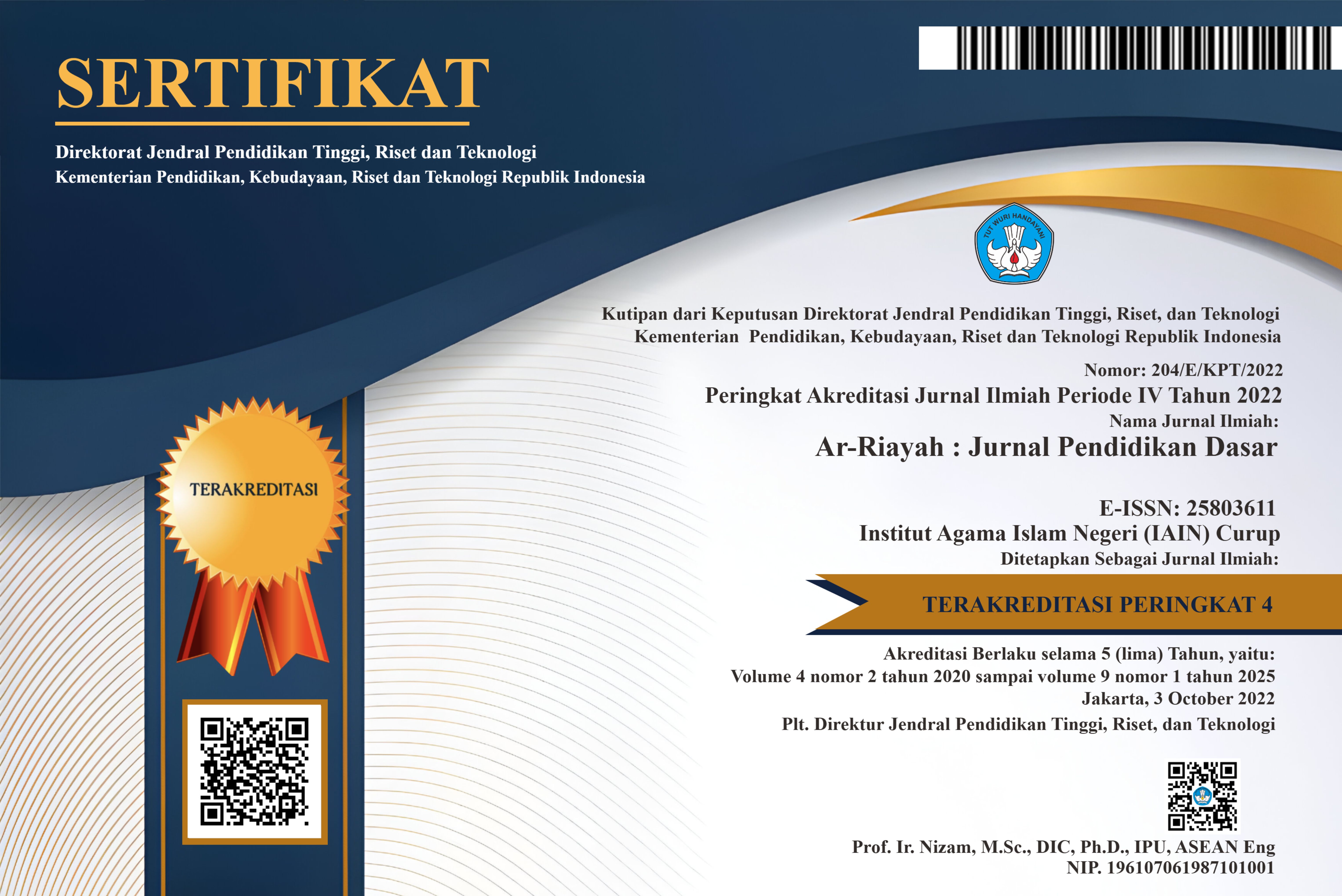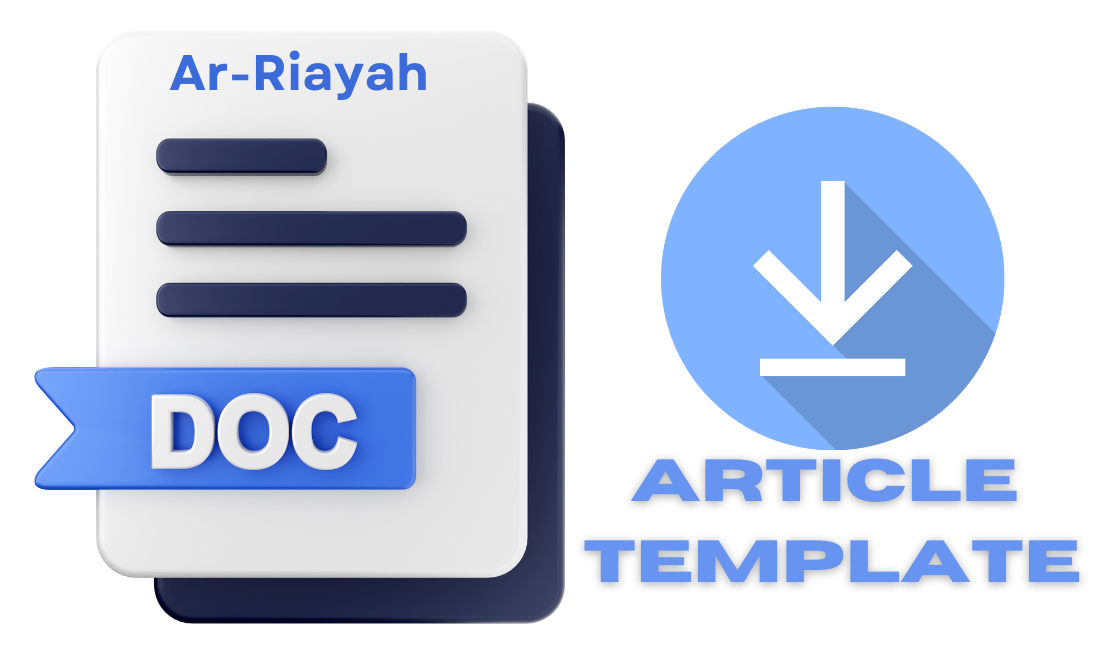Hakikat Fitrah Manusia dan Pendidikan Anak dalam Pandangan Islam (Suatu Tinjauan Teoritis)
DOI:
https://doi.org/10.29240/jpd.v5i2.3506Keywords:
Human Nature, Children EducationAbstract
: Children's education should be based on what is called human nature, because every child who is born has a natural disposition. The environment that exists in educational institutions and the community around the place of residence has a very important role in the effort to develop this nature. Education based on the concept of humanizing humans should be able to develop this potential or nature. In this paper, we will try to examine the nature of human nature and how to educate children when referring to the Islamic view by using library research or library research. The common thread in this paper is that each student has quite a variety of potential, this potential should have a place or container so that it can be maximized. The development of this potential is none other than through a process called education. Education should not always ground students who have only cognitive abilities, there are many special things related to the potential of students who can be developed through the educational process.
Downloads
References
Abdul Baqi Muhammad Fuad, al-Mu’jam al-Mufahrasa li Alfaz al-Qur’an al Karim, Beirut: Dar Ihya al Turas al-‘Arabi
Amstrong, Thomas Multiple Intelligence in The Classroom, Virginia: ASCD, 2009
Chasanah Nur, Pendidikan Anak Berbasis Islam di HEbAT Community: Studi Kasus Fitrah Based Education di HEbAT Community Cabang Malang Jawa Timur , Tesis UIN Malang Tahun 2018
Hasan Chalidjah, Dimensi-Dimensi Psikologi Islam, Surabaya: Al-Ikhlas, 1994
http://digilib.uinsby.ac.id Fitrah Anak dalam Tinjauan Hadist, di akses pada tanggal 27 September 2021
Jalaludin, Teologi Pendidikan, Jakarta: Raja Grafindo, 2001
Lukis Alam, Perspektif Pendidikan Islam Mengenai Fitrah Manusia, Jurnal Tarbawi Volume 1 No. 2 Tahun 2015
M. Idris Miftahul Huda, dan, Nalar Pendidikan Anak, Yogyakarta: AR-RUZZ MEDIA, 2008
Maimunah Hasan, Membangun Kreatiftias Anak Secara Islam, Yogyakarta: Bintang Cemerlang, 2002
Mina Putra Muksal, dkk, Menumbuhkan Fitrah Keimanan (Kajian Konsep Fitrah Based Education), Zuriah: Jurnal Pendidikan Islam Anak Usia Dini Volume 1 No 1 Tahun 2020
Mualimin, Konsep Fitrah Manusia dan Implikasinya dalam Pendidikan Islam, At-Tadzkiyah: Jurnal Pendidikan Islam Volume 8 No 2 Tahun 2017
Mujahid, Konsep Fitrah dalam Islam dan Implikasinya Terhadap Pendidikan Islam, Jurnal Pendidikan Agama Islam Volume 2 No. 1 Tahun 2005
Muniroh Musfiatul, Fitrah Based Education: Implementasi Manajemen Pendidikan Berbasis Fitrah di TK Adzkia Banjarnegara, Manageria: Jurnal Manajemen Pendidikan Islam Volume 4 No 2 Tahun 2019
Musfiatul Muniroh, Fitrah Based Education: Implementasi Manajemen Pendidikan Berbasis Fitrah di TK Adzkia Banjarnegara, Manageria: Jurnal Manajemen Pendidikan Islam Volume 4 No 2 Tahun 2019
Nata Abuddin, Filsafat Pendidikan Islam, Jakarta: Logos Wacana Ilmu, 1997
Oktori Agus Riyan, Urgensi Pendidikan Humanis Religius pada Pendidikan Dasar Islam, Jurnal AR-RIAYAH: Jurnal Pendidikan Dasar Volume 1 No 3 Tahun 2019
Pransiskan Toni, Konsepsi Fitrah Manusia dalam Perspektif Islam dan Implikasinya dalam Pendidikan Islam Kontemporer, Jurnal Ilmiah DIDAKTIKA Volume 17 No 1 Tahun 2016
Rosyid Daniel Mohammad, Sekolah Rumah Strategi Deschooling dalam Peningkatan Kinerja Sistem Pendidikan Nasional, 2017. Di akses pada 01 Oktober 2021
Santosa Harry, Fitrah Based Education, Bekasi: Yayasan Cahaya Mutiara Timur, 2017
Siti Solichah Aas, Konsepsi Pendidikan Anak Berbasis Fitrah dalam Perspektif Alqur’an, Jurnal Mumtaz Volume 1 No 2 Tahun 2017
Yasir Nasution Muhammad, Manusia Menurut Al-Ghazali, Jakarta: Rajawali Press, 1988
Zed Mestika, Metode Penelitian Kepustakaan, Jakarta: Yayasan Obor Indonesia, 2008
Downloads
Published
How to Cite
Issue
Section
Citation Check
License
Authors who publish with Ar-Riayah: Jurnal Pendidikan Dasar agree to the following terms:
Authors retain copyright and grant the journal right of first publication with the work simultaneously licensed under a Creative Commons Attribution-NonCommercial-ShareAlike 4.0 International License (CC BY-NC-SA 4.0) that allows others to share the work with an acknowledgment of the work's authorship and initial publication in this journal.
Authors are able to enter into separate, additional contractual arrangements for the non-exclusive distribution of the journal's published version of the work (e.g., post it to an institutional repository or publish it in a book), with an acknowledgment of its initial publication in this journal.
- Authors are permitted and encouraged to post their work online (e.g., in institutional repositories or on their website) prior to and during the submission process, as it can lead to productive exchanges, as well as earlier and greater citation of published work (See The Effect of Open Access).










